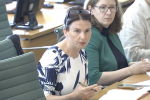
Copeland’s farmers and land managers have had the chance to raise questions around changes to the industry in the first meeting of the Copeland Agriculture Transition Group.
The area’s MP, Trudy Harrison MP hosted the call with senior officials from the Department for Environment, Food and Rural Affairs and members of the local farming community.
The support network was set up to allow farmers to share their concerns and any challenges they face ahead of transitioning to the new system outside of the EU.
Trudy said: “Today’s meeting provided an opportunity to bring together my local farming community to share their feedback directly with government helping them to prepare for the transition period following the UK’s departure from the EU Common Agricultural Policy.
“Farmers know their industry best and so it is vital that they play an integral role in shaping and designing policies as we progress through the transition period, ensuring they work for all.
“The work of our local farming community is so important to our rural economy, which has been made very obvious during the global pandemic.
“There can be no other industry where knowledge and experience are passed on from generation to generation and I want that to continue.”
The meeting follows the launch of sustainable Farming Incentive scheme pilot on Wednesday which aims to attract farmers to take part in the first phase of piloting the Sustainable Farming Incentive scheme, part of the government’s plans to reward future sustainable farming practices.
The Sustainable Farming Incentive will allow farmers to take a fresh look at the land they farm, the natural assets that they have and decide what will work best for their own individual holding, recognising the value of some of the natural assets that were dubbed ‘ineligible features’ by the CAP.
Last year, the Government published The Path to Sustainable Farming: An Agricultural Transition Plan, outlining the changes that will come into force over a seven-year period, helping farmers adapt and plan for the future.
2021 marks the start of the transition period and the beginning of the process to phase out the Basic Payment Scheme (BPS), a scheme made up of direct payments to farmers based on how much land is farmed.
It will be replaced by a new scheme whereby farmers are paid for producing ‘public goods’ such as improving the environment and animal health and welfare as well as reducing carbon emissions and will be co-designed and tested together with farmers, land managers and experts.
The Act also sets out measures to increase transparency and fairness in the supply chain for farmers and food producers as well as the need to encourage the production of food in England, in an environmentally sustainable way.
The support network will meet virtually on a monthly basis to assist in delivering communications on the agriculture sector and transition period.
Farmers or land mangers across Copeland who wish to join the group and attend the next meeting, please email [email protected].


